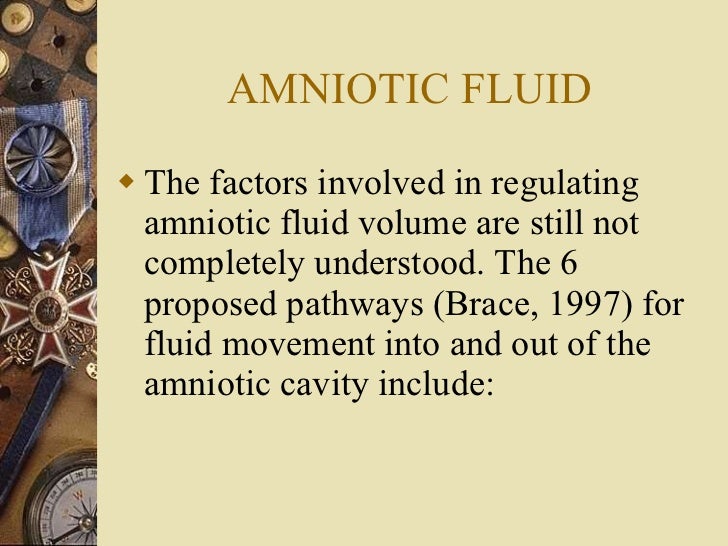

Amniotic fluid embolism: an interdisciplinary challenge: epidemiology, diagnosis and treatment. Amniotic fluid embolism: an evidence-based review. Rudra A, Chatterjee S, Sengupta S, Nandi B, Mitra J. Amniotic fluid embolism syndrome: analysis of the United States International Registry. Amniotic Fluid Embolism (Anaphylactic Syndrome of Pregnancy).Ĭonnecticut State Department of Public Health. Healthy foods include fruits, vegetables, low-fat dairy products, lean meats, and beans. Oligohydramnios can happen at any time during the pregnancy. This fluid surrounds your unborn baby in the womb. What is Amniotic Fluid Embolism?Ĭleveland Clinic. Oligohydramnios is a condition that causes you to have too little amniotic fluid during pregnancy. Amniotic fluid (fetal urine) is crucial in the development of the fetal. This narrowing can slow down or stop the flow of urine, and this in turn can interfere with the development of both the kidneys and the lungs. Amniotic fluid is the fluid that surrounds the.

Most are caused by a narrowing at some point in the urinary tract. Low amniotic fluid or lack of amniotic fluid (oligohydramnios) is when a woman has too little amniotic fluid. Meconium aspiration.Amniotic Fluid Embolism Foundation. There are many causes of urinary tract obstruction in the fetus. A population-based study of meconium aspiration syndrome in neonates born between 37 and 43 weeks of gestation. Respiratory support in meconium aspiration syndrome: A practical guide. You can learn more about how we ensure our content is accurate and current by reading our editorial policy. If a pregnant woman has low levels of amniotic.

We link primary sources - including studies, scientific references, and statistics - within each article and also list them in the resources section at the bottom of our articles. Once a doctor has checked levels and found any possible causes, they can decide on the best treatment options. Medical News Today has strict sourcing guidelines and draws only from peer-reviewed studies, academic research institutions, and medical journals and associations. A study in the International Journal of Pediatrics estimated that about 0.18% of full-term newborns could experience this condition. MAS is a rare complication during childbirth. MAS also increases the likelihood of serious infections, such as pneumonia, which can be particularly severe in a newborn, as their immune system is not yet mature. The condition usually affects full-term newborns born at 37–41 weeks of pregnancy who are small for their gestational age or post-term newborns born after 42 weeks of pregnancy. The resulting signs include difficulty breathing and a bluish tint to the skin. Proper levels of amniotic fluid are essential as this fluid. If the mother is anemic or she has got hypertension which is complicating the pregnancy or if she has pregnancy induced hypertension,these can be the main causes for low. In some cases, the level of amniotic fluid can become too low, and this can be detected through an ultrasound examination (Ultrasonography). The condition can become severe and cause part of the lung to collapse. Amniotic fluid, also known as amnion fluid, plays a significant role in supporting the fetus’s development in the uterus during pregnancy. If a baby breathes in amniotic fluid and meconium, these substances can reach their lungs, blocking the airways. Amniotic fluid surrounds the fetus in the uterus. Doctors may also recommend alternative treatments, like fluid injections or amnio-infusions via an intrauterine catheter. Meconium passes out of the newborn’s body as their first stool. Later-stage pregnancies that experience low amniotic fluid can cause complications during labor and birth (and an increased chance of birth by c-section) and are most often treated through the delivery of your baby. Meconium is a dark green sticky substance comprising materials that the fetus ingested while in the uterus. The placenta peeling away from the inner wall of the uterus either partially or completely before delivery (placental abruption) Certain health conditions in the mother, such as chronic high. MAS occurs when a newborn breathes in a mixture of amniotic fluid and meconium. What causes low amniotic fluid in pregnancy Various factors can contribute to low amniotic fluid in pregnancy, including: Your water breaking. Share on Pinterest Image credit: Jill Lehmann Photography/Getty Images


 0 kommentar(er)
0 kommentar(er)
